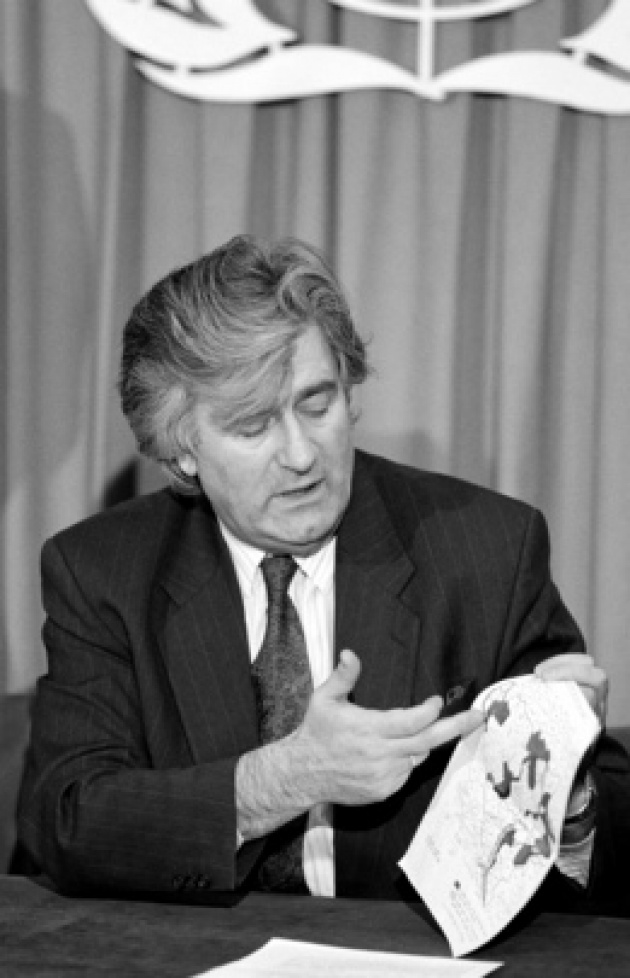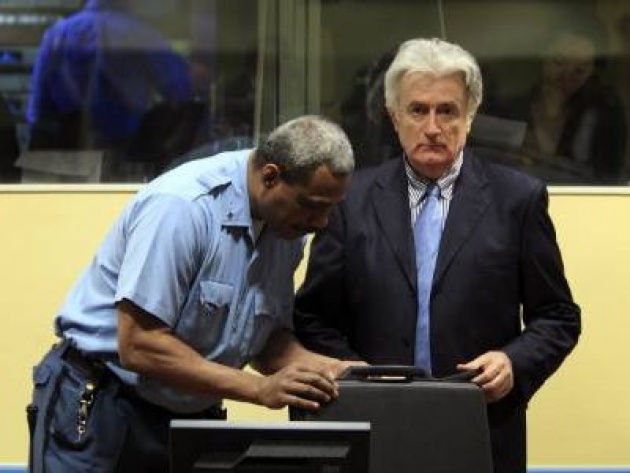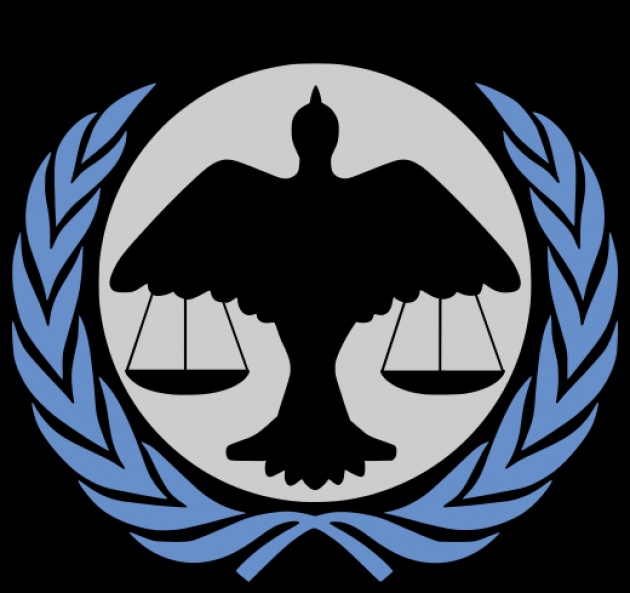
Did Court succumb to political pressure or simply lapse in legal judgment in dismissing the broad genocide charge against Radovan Karadzic? You can read the Press Release from the ICTY below, but very briefly the judgment fails at least on 2 grounds. (Above UN Photo from 1993 - Radovan Karadzic displays his new map for Bosnia & Herzegovina drawn to reflect his vision of an ethnically/artificially redesigned "territory". This was Conference at UN sponsored by Belgrade in 1993: Radovan Karadzic, leader of the Bosnian Serbs, responding to questions from correspondents at a press conference sponsored by the Federal Republic of Yugoslavia [Serbia and Montenegro]).
Sarajevo & all of Bosni a& Herzegovina (BiH) would Resemble Ethnically Cleansed Republika Srpska, Except for BiH’s Defense:
The ICTY does not reject the facts of genocide that occurred both in Srebrenica at the end of the war and the even greater numbers and much broader territory covered during the initial and most ongoing stages of the war from 1992-1995. Rather, the ICTY seems to base its ruling upon one consideration: intent. However, the evidence of intent was espoused from the outset of the conflict by deed and word. Indeed, if the Bosnia & Herzegovina defense forces did not confront and stop the Serbian (Serbian, Bosnian Serb and paramilitary forces acting in concert), then all indication is that all of BiH would resemble today’s Serb entity, “Republika Srpska,” carved out by “ethnic cleansing.” In my experience as BiH UN representative and party to negotiations, Karadzic made it clear that he considered Sarajevo a “Serb city,” and if not but for the heroic defense of the city, today’s Sarajevo would look like so many other cities, towns and villages in Republiks Srpska, bare of its Bosniak (Bosnian Muslim), Bosnian Croat and “other” populations except for sprinkles of aged citizens to project something less than an absolute murder and/or eviction.
The intent to commit genocide in Srebrenica has been already proven and accepted by the ICJ and the ICTY, and it is entirely a continuation, the objective, of the conflict rather than an exception. It is illogical in law as well as fact to infer that intent to commit genocide that occurred in Srebrenica did not exist before when same methodology of killings, expulsions and terror was applied and as or more intensely in some other areas of BiH, from Foca to Prijedor (where the most notorious Omarska concentration camp existed).

Judgments without Effect on the Fruits of Genocide:
Several judgments of genocide in Srebrenica and crimes against humanity/war crimes (grave violations of international humanitarian law), but nothing has been substantively altered on the ground to either reverse the consequences of the crimes or provide remedy to the direct victims. Srebrenica, despite genocide judgment by the ICTY and ICJ, remains under control of those who claim it as part of lineage that committed the crime. There has been pressure from those responsible for applying the Dayton Accords to convert judgments into mere historical analysis. This has neutered the rule of law and embarrassed the judges. Seeing that there is no appetite to deliver appropriate remedy in Srebrenica for genocide in the big power capitals. (from Washington to Moscow to Brussels), the Court is discouraged from delivering a judgment that would impact all of Republika Srpska and the very essence of the Dayton Accords sponsored by such big powers.
Shame on the Court now as well as those who have ignored evidence and the Rule of Law!
ALSO: Read our Blogs Addressing Bosnia & Herzegovina’s Admission to the United Nations in 1992:
Part I -
Part II -
Part III -

Ambassador Muhamed Sacirbey - FOLLOW mo @MuhamedSacirbey
Facebook-Become a Fan at “Diplomatically Incorrect”
Twitter – Follow us @DiplomaticallyX
See more at our Popular Video Blogs & Current News Event Articles - http://diplomaticallyincorrect.org/c/bosnia

ICTY Press Statement:
Trial Chamber III of the International Criminal Tribunal for the former Yugoslavia today dismissed Radovan Karadžić’s oral motion for a judgement of acquittal on ten counts of the indictment but granted his motion in relation to count one of the indictment in which he was charged with genocide for the crimes committed between March and December 1992 in several municipalities of Bosnia and Herzegovina.
The Chamber’s oral ruling was delivered pursuant to Rule 98 bis of the Tribunal’s Rules of Procedure and Evidence which provides that at the close of the Prosecutor's case, the Trial Chamber shall, by oral decision, and after hearing the oral submissions of the parties, enter a judgement of acquittal on any count if there is no evidence capable of supporting a conviction.
The Prosecution charges Karadžić, former President of Republika Srpska, head of the Serb Democratic Party and Supreme Commander of the Bosnian Serb Army, with 11 counts of genocide, crimes against humanity and violations of the laws or customs of war committed in Bosnia and Herzegovina between 1992 and 1995.
Count 1 of the Indictment charges genocide in relation to the crimes alleged to have been committed between 31 March and 31 December 1992 against the Bosnian Muslims and Bosnian Croats in some municipalities in BiH. Having reviewed the totality of the evidence with respect to the killing of, serious bodily or mental harm to, the forcible displacement of, and conditions of life inflicted on Bosnian Muslims and/or Bosnian Croats in the Municipalities, the Chamber found that the evidence even if taken at its highest, does not reach the level from which a reasonable trier of fact could infer that genocide occurred in the Municipalities.
The Chamber noted that genocidal intent can be inferred from a number of factors and circumstances, including the general context of the case, the means available to the perpetrator, the surrounding circumstances, the perpetration of other culpable acts systematically directed against the same group, the numerical scale of atrocities committed, the repetition of destructive and discriminatory acts, the derogatory language targeting the protected group, or the existence of a plan or policy to commit the underlying offence. The Chamber noted that although it has heard evidence of culpable acts systematically directed against Bosnian Muslims and/or Bosnian Croats in the Municipalities, and of the repetition of discriminatory acts and derogatory language, the nature, scale, and context of these culpable acts do not reach the level from which a reasonable trier of fact could infer that they were committed with genocidal intent.
The Chamber found that whilst the evidence it had heard indicates that the circumstances in which the Bosnian Muslims and/or Bosnian Croats in the Municipalities were forcibly transferred or displaced from their homes were attended by conditions of great hardship and suffering, and that some of those displaced may have suffered serious bodily or mental harm during this process, this evidence does not rise to the level which could sustain a conclusion that the serious bodily or mental harm suffered by those forcibly transferred in the Municipalities was attended by such circumstances as to lead to the death of the whole or part of the displaced population for the purposes of the actus reus for genocide.
The Chamber dismissed the Accused’s request for a judgement of acquittal on the remaining ten Counts in the Indictment.
In relation to Counts other than Count I of the Indictment related to the Municipalities, the Chamber found that evidence was presented with regards to Karadzic’s voluntary participation in a joint criminal enterprise (JCE) composed of members of the Bosnian Serb leadership, the purpose of which was to permanently remove the Bosnian Muslims and Bosnian Croats from Bosnian-Serb claimed territory in BiH, that he shared the intent of the other members of this JCE to carry out its objective through the commission of the crimes of persecutions, extermination, murder, deportation and inhumane acts (forcible transfer), and that he contributed to it through his acts and omissions.
In relation to the Hostages component of the case, which covers the alleged detention of over 200 UN peacekeepers and military observers, the Chamber found that there is evidence on which, if accepted, a reasonable trier of fact could be satisfied beyond reasonable doubt that: - the crime of taking hostages as a violation of the laws or customs of war was carried out by Bosnian Serb forces between May and June 1995; that there existed a JCE, the common purpose of which was to take UN personnel hostage in order to compel NATO to abstain from conducting further air strikes against Bosnian Serb military targets; and that that Karadzic voluntarily participated in this JCE and shared the intent of the other members of this JCE to carry out its objective.
In relation to the Sarajevo component of the indictment, the Chamber found that there is evidence on which, if accepted, a reasonable trier of fact could be satisfied beyond reasonable doubt that: - murder charged as a crime against humanity and as a violation of the laws or customs of war was carried out by Bosnian Serb forces in Sarajevo; that the crimes of terror and unlawful attacks were carried out by Bosnian Serb Forces in Sarajevo; between April 1992 and November 1995, that there was a joint criminal enterprise to establish and carry out a campaign of sniping and shelling against the civilian population of Sarajevo; and that the objective of this JCE involved the commission of the crimes of terror, unlawful attacks on civilians, and murder.
In relation to Karadzic’s contribution to the crimes committed during the siege of Sarajevo, the Chamber found that there is evidence upon which, if accepted, a reasonable trier of fact could be satisfied beyond reasonable doubt that the Accused voluntarily participated in the joint criminal enterprise relating to Sarajevo through both his acts and omissions and that he shared the intent of the other members of this JCE to carry out its objective, namely to establish and carry out a campaign of sniping and shelling against the civilian population of Sarajevo with the intent of spreading terror. Further, the Chamber found that there is evidence to suggest that he shared the intent of the other members of the JCE to commit the crimes of murder, terror, and unlawful attacks on civilians.
In relation to the Srebrenica component of the case, the Chamber found that in relation to Counts 4, 5 and 6 of the Indictment, that there is evidence on which, if accepted, a reasonable trier of fact could be satisfied beyond reasonable doubt that: - murder charged as a crime against humanity and as a violation of the laws or customs of war, and extermination charged as a crime against humanity were carried out by Bosnian Serb forces in Srebrenica in 1995.
In relation to Count 2 of the Indictment, genocide in Srebrenica, the Chamber found that there is evidence on which, if accepted, a reasonable trier of fact could be satisfied beyond reasonable doubt that was carried out by Bosnian Serb Forces in Srebrenica.
In relation to Counts 3, 7 and 8 of the Indictment insofar as they relate to Srebrenica, the Chamber found that there is evidence on which, if accepted, a reasonable trier of fact could be satisfied beyond reasonable doubt that the crimes of deportation and forcible transfer, an inhumane act, as crimes against humanity were carried out by Bosnian Serb Forces in Srebrenica in July 1995 and that persecutions charged as a crime against humanity were committed in Srebrenica in July and August 1995 by Bosnian Serb Forces against Bosnian Muslims with the intent to discriminate against them specifically based on race, religion, or politics.
In relation to Karadzic’s responsibility for Counts 2 to 8 as set out above, in relation to Srebrenica, the Chamber was satisfied that there is evidence upon which, if accepted, a reasonable trier of fact could be satisfied beyond reasonable doubt that: - there existed a joint criminal enterprise composed of members of the Bosnian Serb leadership, military, police and other officials including the Accused, the purpose of which was to eliminate the Bosnian Muslims in Srebrenica through the commission of the crimes as charged in paragraph 20 of the Indictment; and that the Accused voluntarily participated in this joint criminal enterprise. The Chamber also found that there is evidence to suggest that the Accused shared the intent of the other members of this joint criminal enterprise to carry out its objectives, including the specific intent to commit genocide and the specific intent to discriminate against the Bosnian Muslims in Srebrenica specifically based on race, religion, or politics.
Karadžić was indicted on 25 July 1995 and was transferred into the Tribunal’s custody on 30 July 2008 after more than 13 years spent evading arrest. The trial began on 26 October 2009. The Defence case is scheduled to open on 16 October 2012
Since its establishment, the Tribunal has indicted 161 persons for serious violations of international humanitarian law committed on the territory of the former Yugoslavia between 1991 and 2001. Proceedings against 126 have been concluded. Proceedings are currently ongoing for 35 Accused.



